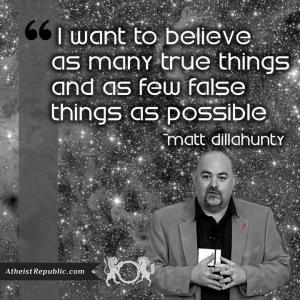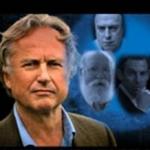“I want to believe as many true things and as few false things as possible,” goes the motto of radio show host Matt Dillahunty. As critical thinkers, we need to ask whether this is a valid approach to truth.
True and False
It sounds to me like Dillahunty is making a simplistic distinction between true things and false things, as if claims either have some inherent property of trueness or they don’t. There’s no quickie litmus test for truth; the way we judge claims or beliefs true is a very complicated and contextual process. The way we approach truth in scientific matters is a lot different than the way we do in terms of art or politics. And even scientific claims aren’t true or false in such a binary way: “the Earth is flat” and “the Earth is round” are both —strictly speaking— false, but the former is certainly more false than the latter.
Anyone who realizes the difference between the content of our beliefs and the grounds for believing them can see that Dillahunty’s motto is tautological. The only reason we consider things true is that we affirm that there are good reasons to believe them. This is like saying, “I only want to see visible things.” There’s no special category of visible things, or a special property of visibility that certain things possess; we simply consider them visible if we can see them.
Quantity over Quality
I don’t understand why Dillahunty emphasizes the number of true things one believes. It’s as if he thinks there’s some sort of philosophical batting average that we’re always looking to improve. Critical thinking, however, consists of understanding why we’re justified in believing things.
What bothers me most about the motto is that characterizing certain things as having the property of trueness implies that truth is somehow eternal and unchanging, mind-independent and regardless of context. The assumption seems to be that once this true thing is in his collection, one never has to question its validity ever again. Since Dillahunty is a popular atheist media celebrity, this approach seems quasi-religious. Critical thinking involves constantly questioning what one thinks, rather than deciding one’s beliefs are true and having done with it.
What do you think? Am I misinterpreting Dillahunty’s motto? What’s the proper approach to truth?















